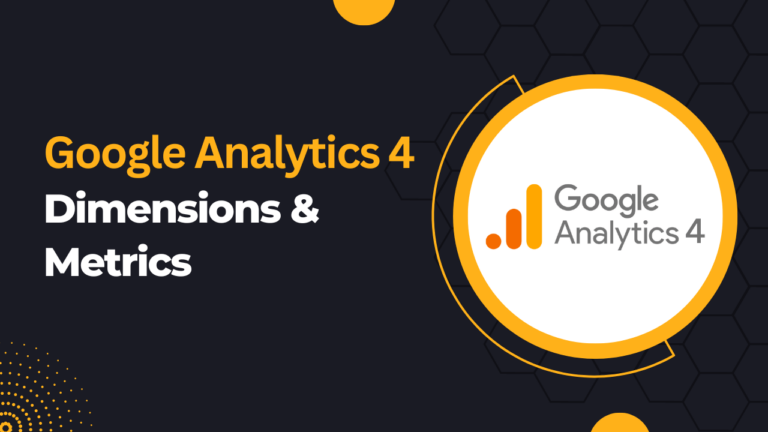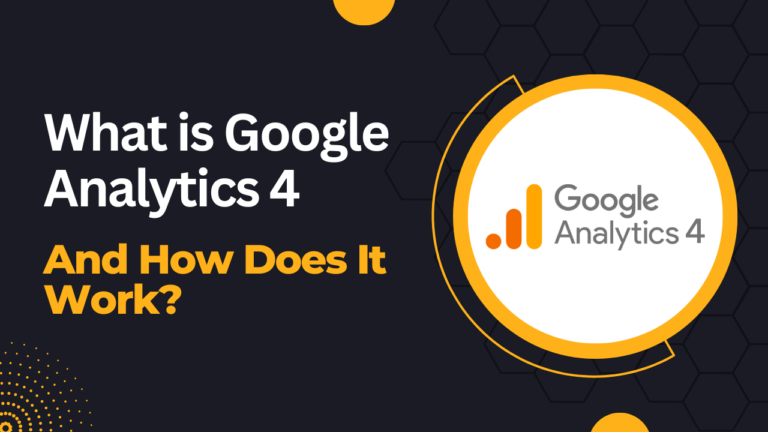In the ever-evolving world of web analytics, Google Analytics has long been the trusted tool for measuring website performance and gaining valuable insights. And now, the introduction of Google Analytics 4 (GA4) brings forth a new era of analytics capabilities.
As a marketer or website owner, you may be curious about the key differences that set GA4 apart from its predecessor, Universal Analytics.
In this blog post, we’ll dive deep into the key distinctions between GA4 and Universal Analytics. We’ll explore the features, functionalities, and benefits of GA4, and explore how it can revolutionize the way you track and analyze your website data.

Understanding the Transition
Before diving into the differences, it’s essential to understand the context of the transition from Universal Analytics to GA4.
GA4 represents a significant evolution of Google Analytics, introducing a user-centric approach to analytics that focuses on machine learning and privacy-centric data collection and analysis. While Universal Analytics is still supported, GA4 is positioned as the future of Google Analytics, paving the way for more advanced and personalized insights.
Now, let’s delve into the differences between GA4 and Universal Analytics, so you can grasp the unique features and advantages of each platform.
Google Analytics 4 vs Universal Analytics
| Feature | Universal Analytics | Google Analytics 4 |
| Data Model | Event-based tracking with dimensions and metrics. | Enhanced event-driven model for more flexibility and scalability. |
| Event Tracking and Measurement | Tracking of individual events with manual configuration. | Tracking of multiple simultaneous events, user properties, and enhanced parameters. Automatic event tracking for streamlined implementation. |
| User-Centric Focus | Session-based data tracking relying on cookies. | User-centric approach with enhanced user ID feature for cross-device and cross-platform tracking. |
| Machine Learning and Insights | Limited integration with machine learning capabilities. | Leverages machine learning models for advanced metrics, such as churn probability and revenue prediction. |
| Privacy and Data Governance | Basic privacy controls with limited user data management. | Privacy-centric data collection and analysis, supports data deletion and consent management. Compliance with regulations like GDPR and CCPA. |
| Integration with Google Marketing Platform | Compatible with Google Marketing Platform tools but lacks seamless integration. | Seamless integration with Google Ads, Google Tag Manager, and BigQuery for enhanced capabilities. |
| Migration Process | Current tracking code and setup. | Setting up a new property and implementing GA4 tracking code, with migration resources provided by Google. |
Now let’s understand them in detail.
1. Data Model
One of the fundamental differences between GA4 and Universal Analytics lies in their data models. Universal Analytics is event-based, where interactions are tracked as discrete events, and data is organized into dimensions and metrics.
GA4, on the other hand, adopts an enhanced event-driven model that allows for more flexibility and scalability. It emphasizes the importance of user interactions and employs an event-driven approach to capture and analyze data.
2. Event Tracking and Measurement
In terms of event tracking and measurement, GA4 offers more advanced capabilities compared to Universal Analytics. GA4’s event tracking is more flexible, allowing for the tracking of multiple simultaneous events, user properties, and enhanced parameters.
This flexibility enables deeper insights into user behavior and engagement across various touchpoints. Additionally, GA4 introduces automatic event tracking, which reduces the need for manual configuration and makes implementation more streamlined.
3. User-Centric Focus
GA4 introduces a more user-centric approach to analytics, shifting the focus from session-based data to individual user behavior. Universal Analytics primarily relies on cookies to track user activity within a session, making it challenging to track users across devices or when cookies are deleted.
GA4 addresses this limitation by utilizing an enhanced user ID feature, enabling cross-device and cross-platform tracking. This user-centric focus empowers marketers to gain a holistic view of user interactions and engagement, leading to more accurate insights.
4. Machine Learning and Insights
Machine learning plays a significant role in GA4, offering marketers powerful insights and automation capabilities. GA4 leverages machine learning models to provide valuable metrics such as churn probability, revenue prediction, and lifetime value.
These insights enable businesses to make data-driven decisions, optimize marketing strategies, and improve user experience. Universal Analytics, although robust, lacks this level of advanced machine learning integration.
5. Privacy and Data Governance
With increasing concerns about user privacy, GA4 has made privacy-centric data collection and analysis a priority. It allows users to exercise more control over their data, offering features like data deletion on user requests and simplified consent management.
GA4 also supports the implementation of privacy regulations like the General Data Protection Regulation (GDPR) and the California Consumer Privacy Act (CCPA). Universal Analytics, while offering some privacy controls, does not provide the same level of built-in privacy features.
6. Integration with Google Marketing Platform
Another notable difference between the two versions is their integration with the Google Marketing Platform. GA4 is designed to seamlessly integrate with other Google marketing tools, including Google Ads, Google Tag Manager, and BigQuery.
This integration enables marketers to unlock more advanced features, such as importing conversion data directly from Google Ads. Universal Analytics, while still compatible with these tools, lacks the same level of integration and cross-platform synergy.
How to Set up/Migrate to GA4?
For those currently using Universal Analytics, migrating to GA4 may seem daunting. However, Google provides a simplified migration process, making it easier to transition between the two platforms.
The migration typically involves setting up a new GA4 property, implementing the GA4 tracking code, and ensuring data continuity during the transition period. Google offers resources and guides to facilitate the migration process and minimize disruption to data analysis and reporting. We have an in-depth article on how to set up GA4 for your website.
Conclusion
In summary, Google Analytics 4 and Universal Analytics represent two distinct generations of web analytics platforms. GA4 introduces a more user-centric, privacy-focused approach, leveraging machine learning for advanced insights and automation.
With its enhanced event tracking, user-centric focus, and seamless integration with the Google Marketing Platform, GA4 offers marketers a more comprehensive and future-proof analytics solution.
While Universal Analytics continues to be supported, transitioning to GA4 ensures access to the latest features and capabilities, empowering businesses to make informed decisions based on a deeper understanding of user behavior and engagement.


